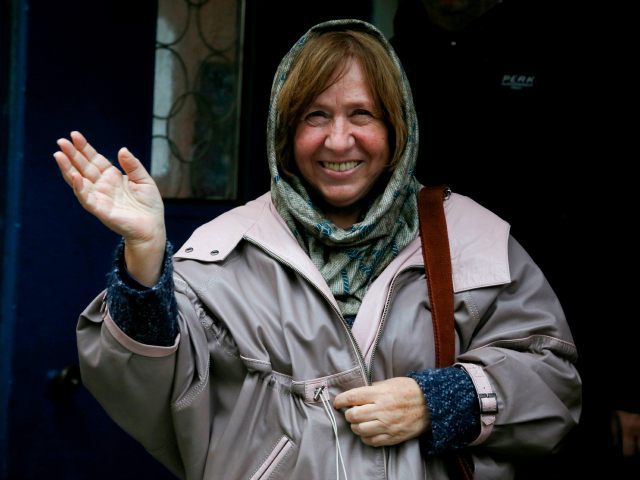Belarusian author Svetlana Alexievich condemned Russia’s invasion of Ukraine when she won the 2015 Nobel Prize for Literature for her work that portrayed the cruel reality of living in the Soviet Union. She documents experiences of between 500 and 700 people for each book.
“Real people speak in my books about the main events of the age such as the war, the Chernobyl disaster, and the downfall of a great empire,” she explained. “Together they record verbally the history of the country, their common history, while each person puts into words the story of his/her own life.”
She continued: “I’m writing a history of human feelings. What people thought, understood and remembered during the event. What they believed in or mistrusted, what illusions, hopes and fears they experienced. This is impossible to imagine or invent, at any rate in such multitude of real details.”
She also used this opportunity to condemn Russia’s aggression towards Ukraine and Belarus President Alexander Lukashenko.
“It is occupation, a foreign invasion,” she stated. “I love the good Russian world, the humanitarian Russian world, but I do not love the Russian world of Beria, Stalin and Shoigu.”
Lavrenty Beria was in charge of the massive purges under Soviet Union leader Josef Stalin. Sergei Shoigu is the current Russian defense minister. He is the one who told Russian President Vladimir Putin on television that all 26 missiles fired from Russian ships in the Caspian Sea successfully hit their targets in Syria.
Alexievich was born in Ukraine to a Ukrainian mother and Belarusian father. They moved back to Belarus, but she went into “exile for many years because of her criticism of the Belarusian government.” She returned four years ago.
The media reported Lukashenko does “hold her criticism of his government against her.”
“I am happy for her because she is a citizen of Belarus,” he said. “It’s good for a person to take up a position. Maybe it’s in the opposition. That’s her form, her style. I don’t have anything against her.”
Alexievich made it clear she will not vote in Sunday’s election “because we know who will win.” Lukashenko proudly told Reuters he is the “last and only dictator in Europe.” His three so-called challengers are not a threat to his reign, which he has held since 1994.
However, he is a complex character. At times, he appears close to Russian President Vladimir Putin. He did, though, criticize the Kremlin when they annexed Crimea from Ukraine in March 2014. He warmly welcomed Russia, Ukraine, France, and Germany in rounds of peace talks to end the ongoing crisis in east Ukraine. Lukashenko also pardoned “six opposition leaders in August.” These actions made observers believe “he is seeking to improve his image in the West.”
Her close friend Andrei Sannikov, an opposition leader in Belarus, said she “writes about ‘the history of the Red Man.’”
“She claims he is not gone,” he clarified. “She argues that this man is inside us, inside every Soviet person. Her last book, Second-hand Time, is dedicated to this problem.”

COMMENTS
Please let us know if you're having issues with commenting.